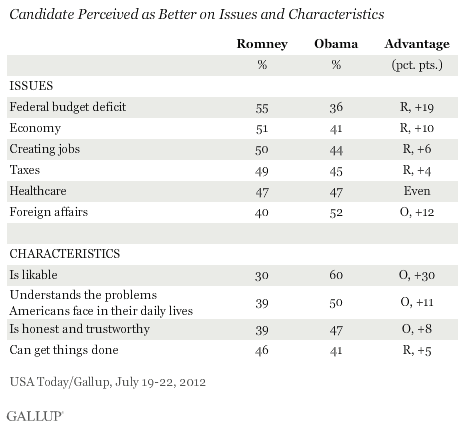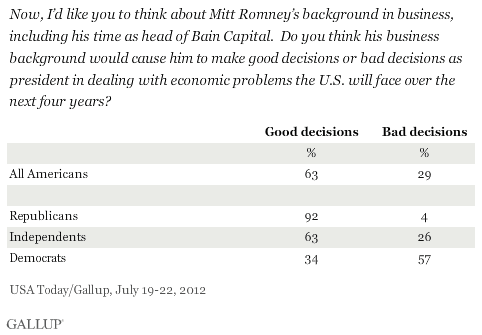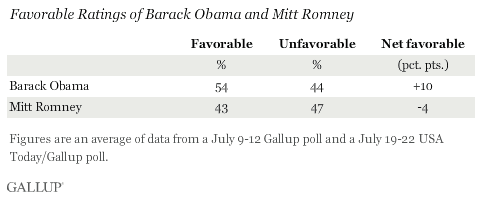PRINCETON, NJ -- Americans tend to see Mitt Romney as better able to handle key issues than President Obama is, particularly those relating to the economy. However, Americans give Obama the edge on most character dimensions, especially basic likability.

Romney has an edge on four of six issues tested in the July 19-22 USA Today/Gallup poll -- all having a significant economic component, including the federal budget deficit, the economy, creating jobs, and taxes. Romney and Obama are tied on healthcare, while Obama's lone lead in the poll is his decided advantage on foreign affairs.
On the other hand, Obama is viewed as more likable, more honest and trustworthy, and better able to understand the problems Americans face than Romney is. Romney's only character advantage of the four included in the poll is for being able to "get things done."
These differences help explain why Obama and Romney remain closely matched in voters' general election preferences. In July 17-23 Gallup Daily tracking, 46% of registered voters say they would vote for Obama and 45% for Romney if the election were held today.
Many of the important contextual indicators, such as national satisfaction and economic confidence, are below their levels from years in which recent incumbent presidents were re-elected. However, Americans have not warmed to Romney even though they view him as the candidate better equipped to handle economic matters, the public's overwhelming concerns this election year.
Romney's advantage on economic issues likely stems from Americans' generally negative assessment of Obama's economic stewardship as well as Romney's own business background. Americans continue to be more pessimistic than optimistic about the economy, and President Obama has gotten low marks for his handling of the economy for most of his presidency.
And while the Obama campaign has tried to criticize Romney's business record, particularly his time as head of Bain Capital, the public by a wide margin sees his background as a plus. Specifically, the July 19-22 USA Today/Gallup poll finds 63% of Americans saying Romney's business background would cause him to make good decisions about how to deal with economic problems the U.S. would face, while 29% say it would cause him to make bad decisions. A majority of independents say Romney would make good decisions.

Economic Strengths May Not Be Enough to Win Over Voters
Given the closeness of the race at this point, it appears having an advantage on the dominant issue of the day is not sufficient to convince voters to elect a candidate. Romney's Achilles' heel may be a significant likability deficit to Obama, both in how Americans view each candidate individually and in their perceptions of who is more likable.
Americans overwhelmingly continue to believe Obama is the more likable of the two candidates, by 60% to 30%, a gap basically unchanged from earlier this year.
The differences are smaller when Americans say whether they have a favorable or unfavorable opinion of each candidate individually, though Obama still owns a significant advantage. In two Gallup polls conducted this month, an average of 54% of Americans have a favorable opinion of Obama, while 44% have an unfavorable view. In contrast, Romney's views average out slightly more negative (47%) than positive (43%) in the same two polls.

That is a less positive assessment of Romney than shortly after he won the Republican nomination, but consistent with opinion of him during the Republican nomination campaign. Thus, the improved opinion of Romney after he won the nomination -- which usually occurs for the winners -- proved to be short-lived and he is now essentially back to where he was at earlier points in the campaign.
Implications
With less than four months to go before voters register their final preferences for president in the 2012 election, Romney's and Obama's strengths and weaknesses in the eyes of Americans are coming into focus. Americans view Romney's business background as more of an asset than a liability in terms of his ability to deal with the economy, and they consequently see him as better able to handle economic matters.
Yet Americans do not view Romney personally in as favorable a light as they view Obama. While that may not seem as important a consideration for voters as their perceptions of the candidates' competence or their agreement with the candidates' issue positions, the better-liked candidate on the eve of the election has won each of the last five elections.
The candidates still have an opportunity to change voters' perceptions of them and their strengths and weaknesses, including at the upcoming party conventions and in the presidential debates. For now, it appears as if Romney's economic strengths and Obama's likability edge are offsetting one another, as voters are evenly divided in their preferences for whom they want to be the next president.
Survey Methods
Results for this USA Today/Gallup poll are based on telephone interviews conducted July 19-22, 2012, with a random sample of 1,030 adults, aged 18 and older, living in all 50 U.S. states and the District of Columbia.
For results based on the total sample of national adults, one can say with 95% confidence that the maximum margin of sampling error is ±4 percentage points.
Interviews are conducted with respondents on landline telephones and cellular phones, with interviews conducted in Spanish for respondents who are primarily Spanish-speaking. Each sample includes a minimum quota of 400 cell phone respondents and 600 landline respondents per 1,000 national adults, with additional minimum quotas among landline respondents by region. Landline telephone numbers are chosen at random among listed telephone numbers. Cell phone numbers are selected using random-digit-dial methods. Landline respondents are chosen at random within each household on the basis of which member had the most recent birthday.
Samples are weighted by gender, age, race, Hispanic ethnicity, education, region, adults in the household, and phone status (cell phone only/landline only/both, cell phone mostly, and having an unlisted landline number). Demographic weighting targets are based on the March 2011 Current Population Survey figures for the aged 18 and older non-institutionalized population living in U.S. telephone households. All reported margins of sampling error include the computed design effects for weighting and sample design.
View methodology, full question results, and trend data.
In addition to sampling error, question wording and practical difficulties in conducting surveys can introduce error or bias into the findings of public opinion polls.
For more details on Gallup's polling methodology, visit www.gallup.com.
